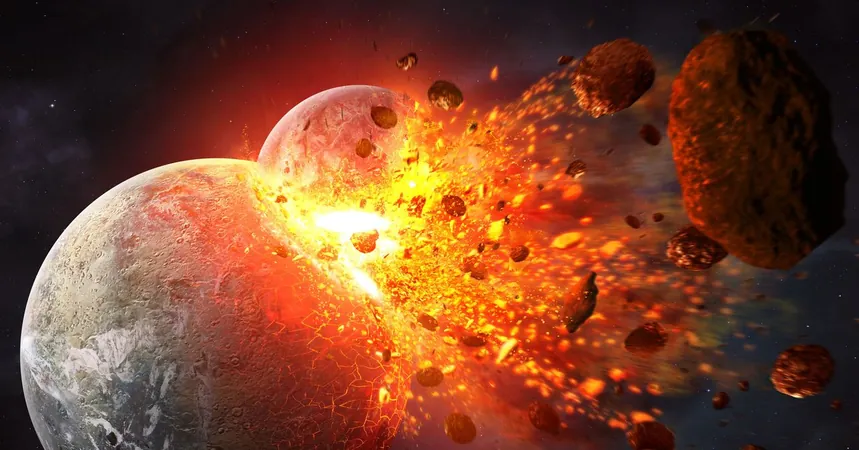
Did a Cataclysmic Impact Ignite Life on Earth?
2025-09-18
Author: Arjun
Imagine a time over 4.5 billion years ago when Earth was just a fiery ball of rock—until a colossal collision changed everything! Scientists theorize that our planet smashed into an object the size of Mars, known as Theia, which may have been the key to kickstarting life as we know it.
Research from the University of Bern reveals that the early Earth was a scorching, dry world, losing essential volatile elements like hydrogen and carbon due to its proximity to the sun. Without these building blocks, the conditions for complex life would have never been established. But what if Theia brought with it vital substances? If an icy celestial body had collided with the young Earth, it could have delivered the rich chemicals and water needed for life.
New Insights from Space Rocks!
In a breakthrough study published in *Science Advances*, scientists analyzed the radioactive decay of manganese and chromium isotopes found in both Earth and meteorite samples. This analysis provided a glimpse into the planet's violent past, showing that Earth stabilized its chemistry just 3 million years after the solar system's birth.
The low ratio of manganese to chromium indicated that the proto-Earth was so hot it expelled these elements into space, making it even drier. As Pascal Kruttasch, the study's lead author, put it, only after this titanic impact with Theia did Earth receive volatile elements, paving the way for life.
Theia: Catalyst for Life?
The mythical Theia is believed to have slammed into proto-Earth between 30 and 100 million years after the solar system formed, transforming it into a life-nurturing environment. However, bringing water and volatile elements alone isn't enough to create life. It's the ideal conditions these elements create that eventually can lead to biological processes.
So while Theia provided the backdrop, it didn’t bring life itself—just the right ingredients for it to flourish. The incredible interplay of cosmic events and chemical elements is a stunning reminder of how life on Earth might just be the result of a celestial collision!
Why This Matters Today
Understanding the origins of life on our planet helps scientists strategize in the search for extraterrestrial life. If impacts like Theia's were crucial for life on Earth, what could that mean for icy worlds in distant solar systems? Could they harbor the same potential for life?
As we continue to unveil the mysteries of our planet's past, every piece of the cosmic puzzle brings us closer to understanding not just our origins—but also our place in the universe.




 Brasil (PT)
Brasil (PT)
 Canada (EN)
Canada (EN)
 Chile (ES)
Chile (ES)
 Česko (CS)
Česko (CS)
 대한민국 (KO)
대한민국 (KO)
 España (ES)
España (ES)
 France (FR)
France (FR)
 Hong Kong (EN)
Hong Kong (EN)
 Italia (IT)
Italia (IT)
 日本 (JA)
日本 (JA)
 Magyarország (HU)
Magyarország (HU)
 Norge (NO)
Norge (NO)
 Polska (PL)
Polska (PL)
 Schweiz (DE)
Schweiz (DE)
 Singapore (EN)
Singapore (EN)
 Sverige (SV)
Sverige (SV)
 Suomi (FI)
Suomi (FI)
 Türkiye (TR)
Türkiye (TR)
 الإمارات العربية المتحدة (AR)
الإمارات العربية المتحدة (AR)